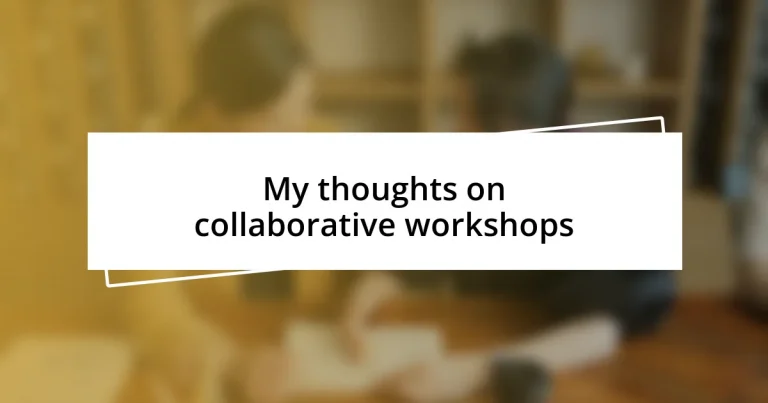Key takeaways:
- Collaborative workshops harness diverse perspectives, leading to innovative solutions and enhanced creativity.
- Key elements for effective workshops include clear objectives, engaged facilitation, and a structured agenda.
- Technology, such as digital collaboration tools and feedback surveys, enhances engagement and productivity in workshops.
- The future of workshops may incorporate VR and AI to create more immersive and personalized experiences for participants.
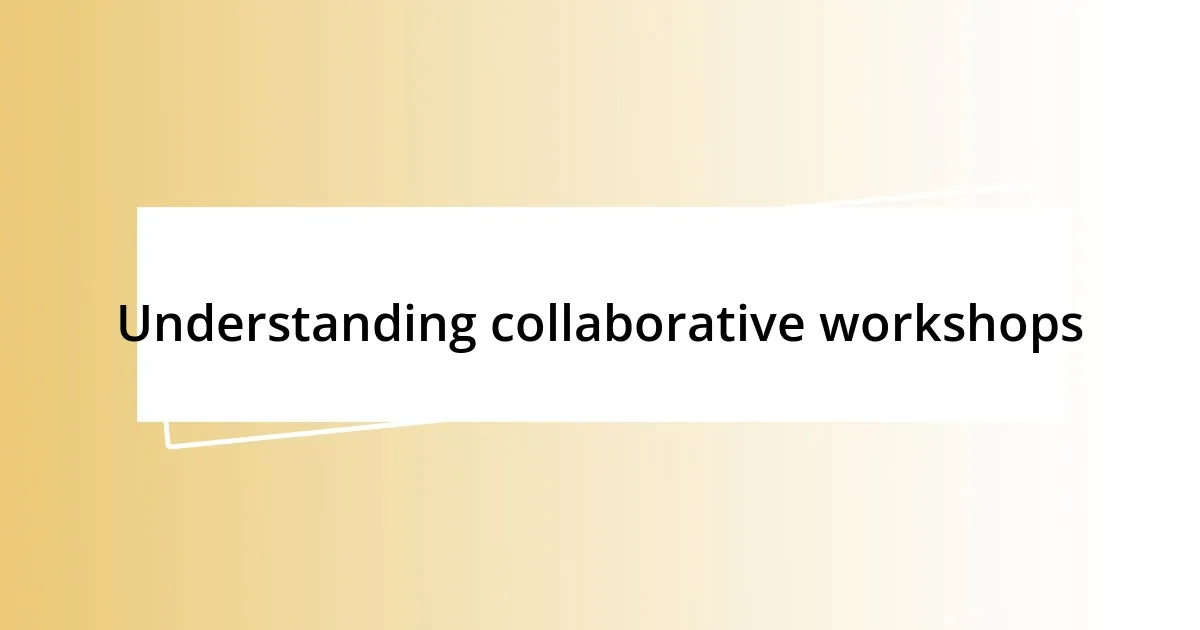
Understanding collaborative workshops
Collaborative workshops are fascinating spaces where diverse minds converge to generate creative solutions. I remember my first experience in such a setting; the energy was palpable as ideas bounced around the room, igniting excitement and inspiring new perspectives. Have you ever felt that spark when a group suddenly aligns on a shared vision?
These workshops thrive on the different viewpoints participants bring. Each person has unique experiences and insights, which can lead to breakthrough moments. For instance, during a recent workshop, we tackled a complex problem, and it was a quiet participant’s offhand comment that shifted our entire approach. Isn’t it incredible how sometimes the most reserved voices can bring forth the most profound ideas?
In essence, the true power of collaborative workshops lies in their ability to nurture collective intelligence. They allow us to venture beyond the limits of our own understanding and explore new horizons together. When I see a team working seamlessly, feeding off each other’s energy, it reinforces my belief that together we can achieve so much more than we could ever dream of alone. What do you think? Isn’t collaboration a catalyst for deeper innovation?
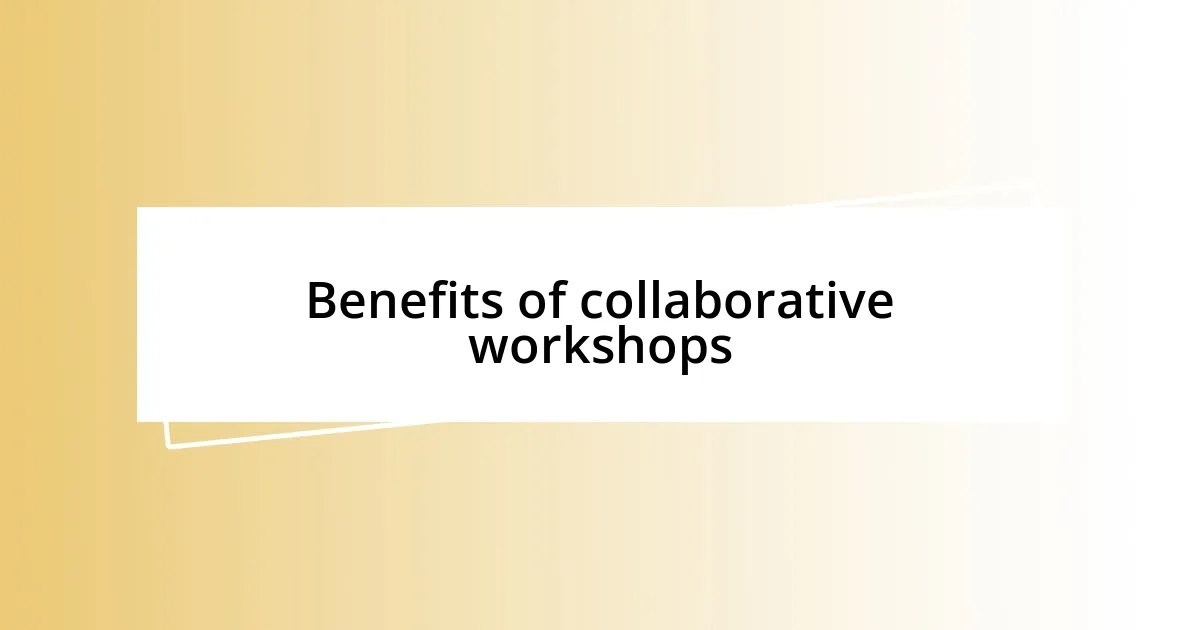
Benefits of collaborative workshops
Collaborative workshops offer numerous benefits that can significantly enhance the creative process. One major advantage is the pooling of diverse talents and viewpoints. I recall a workshop where we mixed marketing professionals with engineers. The synergy was fascinating! Each group brought something unique to the table, resulting in innovative solutions we hadn’t anticipated before. Doesn’t it make you consider how collaboration can enrich our perspectives?
Additionally, these workshops foster an environment of trust and open communication. One time, I was part of a team struggling to finalize a project. As we shared our struggles in a workshop setting, the collective support and brainstorming helped us feel safe to express uncertainties. It was remarkable how vulnerability can spark creativity. What have you experienced in terms of team collaboration?
Lastly, I believe that collaborative workshops can significantly boost morale. When team members feel their contributions are valued, it strengthens relationships and encourages engagement. I’ve seen teams that were once hesitant transform into cohesive units after just a few sessions together. Isn’t it inspiring to see how collaboration can shift team dynamics for the better?
| Benefits | Examples |
|---|---|
| Diverse Perspectives | Team members from different backgrounds contribute unique solutions. |
| Open Communication | Encourages sharing ideas and vulnerabilities, enhancing creativity. |
| Boosted Morale | Collaborative work leads to deeper connections and increased engagement. |
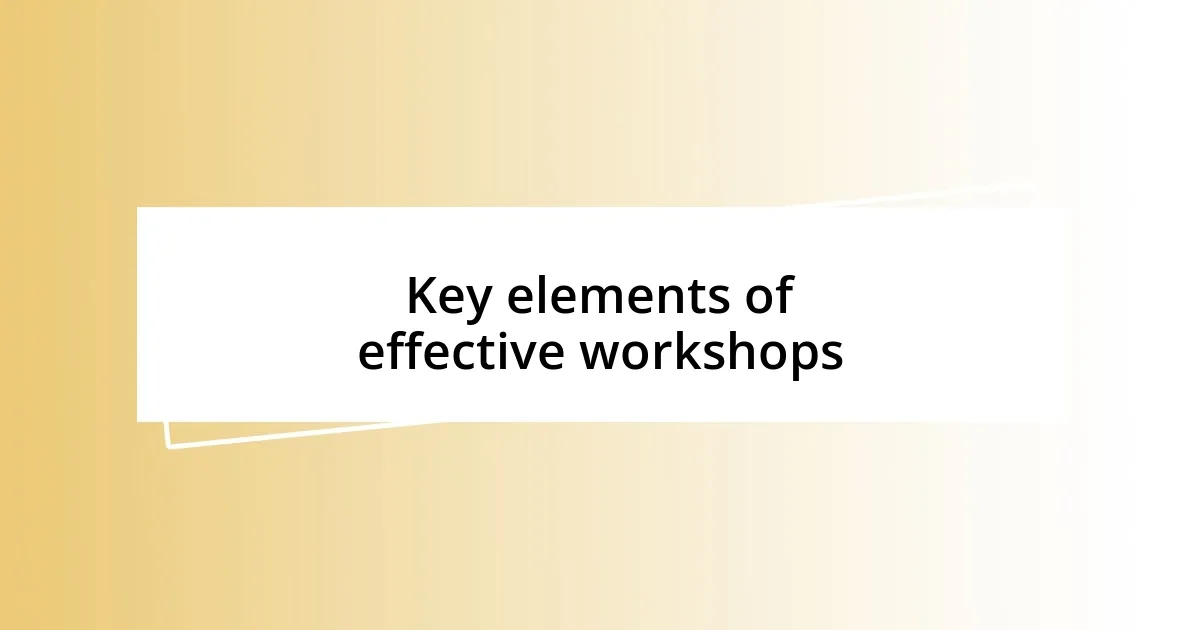
Key elements of effective workshops
Key elements of effective workshops hinge on a few crucial components. I’ve participated in many workshops, and I can confidently say that having a clear purpose is vital. When everyone understands the goals, it creates alignment and focus, driving productivity. In one workshop I attended, the facilitator emphasized a specific outcome, and it transformed the energy in the room. I could feel the collective determination to achieve that goal, which made the experience so much more fulfilling.
- Engaged Facilitation: A skilled facilitator guides discussions and nurtures participation, ensuring all voices are heard.
- Diverse Participant Mix: Including individuals with varying backgrounds promotes richer dialogue and innovation.
- Structured Agenda: A well-planned agenda keeps the workshop on track and maximizes time efficiency.
The environment plays a significant role too; I tend to remember workshops where creative spaces were prioritized. During one particularly memorable session, we arranged ourselves in a circle, resulting in a more open atmosphere. I noticed how shifting the physical setup encouraged more candid exchanges; it felt less formal and more collaborative. When participants feel comfortable, they’re more likely to share their ideas and insights, allowing the magic of collaboration to flourish.
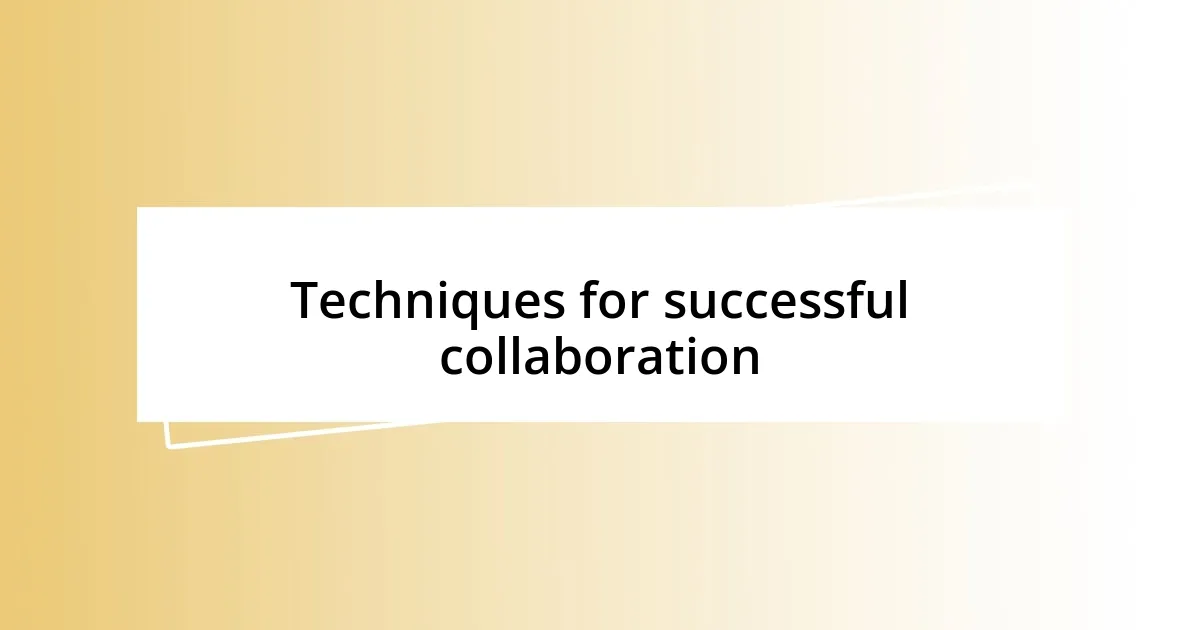
Techniques for successful collaboration
One effective technique for successful collaboration is to establish ground rules early on. I once attended a workshop where we created a list of agreements, like respecting speaking time and being open to all ideas. This simple step fostered mutual respect and paved the way for honest conversations. Have you ever noticed how such norms can transform group dynamics?
In my experience, the use of creative brainstorming techniques can unlock hidden potential. I vividly remember a session where we used mind mapping to visually organize our thoughts. Seeing ideas branch out like a tree sparked inspiration and encouraged everyone to contribute. It’s amazing how visual tools can make abstract concepts tangible and ignite enthusiasm in a group, isn’t it?
Lastly, I find that regularly checking in with team members throughout the workshop can strengthen collaboration. During a project discussion, I encouraged brief pauses for feedback, which allowed us to recalibrate and address any tensions. This proactive approach kept everyone engaged and aligned, creating a more cohesive and productive environment. Have you found that keeping the lines of communication open during sessions makes a significant difference?
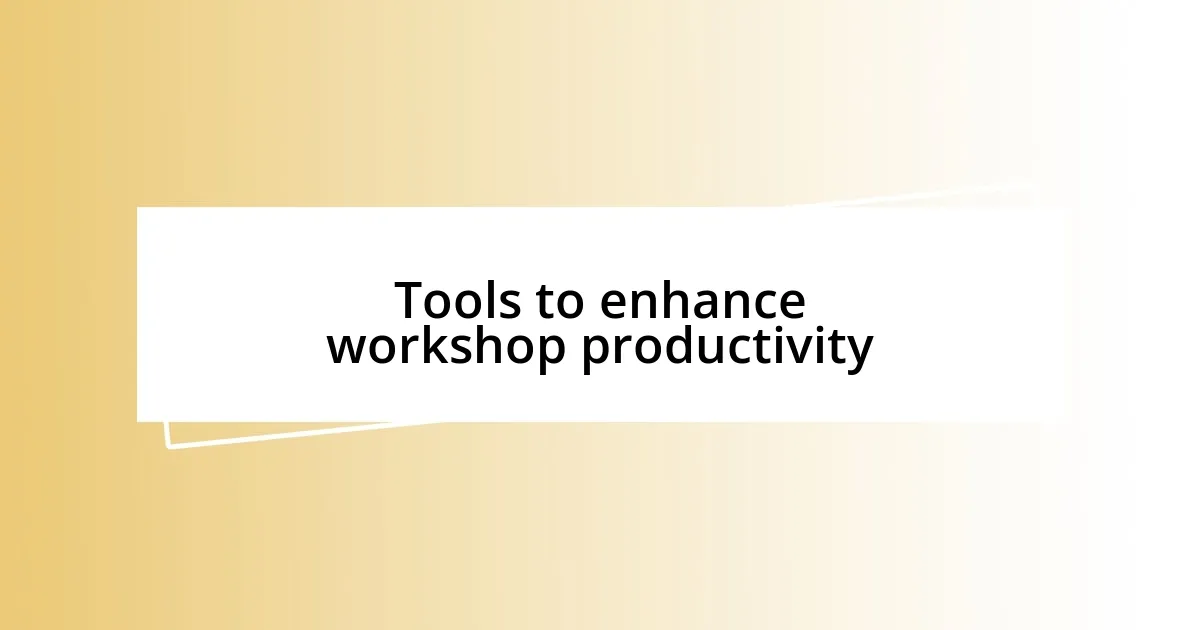
Tools to enhance workshop productivity
To enhance workshop productivity, leveraging technology can make a remarkable difference. I’ve seen how digital collaboration tools like Miro or MURAL transform groups into dynamic, interactive units. During a recent workshop, we used Miro to create a virtual whiteboard, allowing everyone to contribute ideas in real-time. It felt exhilarating to see our thoughts visually connect and evolve right before our eyes—like painting a masterpiece together, don’t you think?
Another invaluable resource is time management software. In my experience, using apps like Trello or Asana to outline tasks and deadlines promotes accountability. I recall a workshop where we set specific time slots for each agenda item, complete with timers. The pressure of the countdown invigorated our discussions and kept us on track. Have you ever noticed how that ticking clock can spur productivity and focus?
Lastly, incorporating feedback tools like polls or surveys can significantly enhance engagement. At a workshop I attended, we used a quick poll to gauge participant opinions, allowing everyone to voice their thoughts instantly. It not only made participants feel valued but also provided real-time insights that shaped our discussions. Isn’t it fascinating how simple tools can unlock deeper, more meaningful connections in collaborative settings?
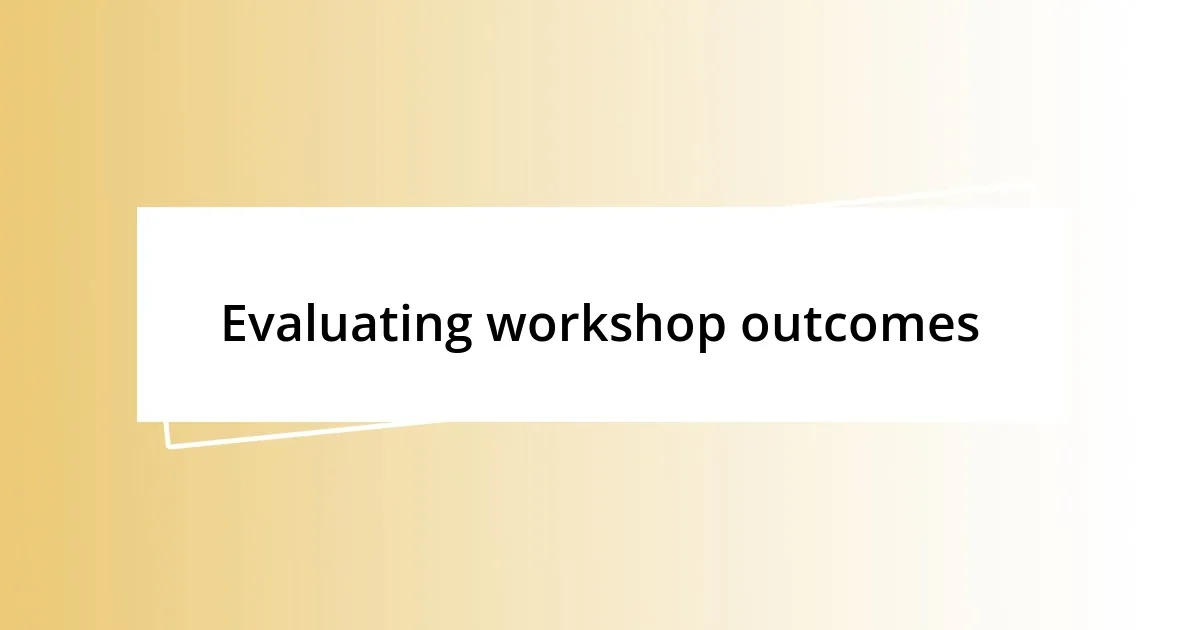
Evaluating workshop outcomes
Evaluating workshop outcomes is crucial to understand what worked and what didn’t. I remember participating in a workshop where we ended with a debriefing session. It was enlightening to hear different perspectives on our experience and the outcomes we achieved. This practice not only highlighted successes but also unveiled areas for improvement. Have you ever realized how much constructive feedback can evolve your future workshops?
To gauge the effectiveness, I often rely on specific metrics like participant engagement levels and the quality of outputs produced. In one workshop, we used a simple rating scale to measure how participants felt about various activities. The results were eye-opening! They not only indicated high satisfaction but also underscored aspects that could be more interactive next time. What methods do you think effectively capture participant sentiments?
Finally, documenting and tracking the follow-up actions taken after the workshop can provide invaluable insights into its long-term impact. After my last session, I created a shared document to outline the agreed-upon next steps. Revisiting those commitments days later sparked new conversations and collaborations, ensuring that our time together had lasting value. Isn’t it interesting how a simple follow-up can continuously enhance group dynamics?
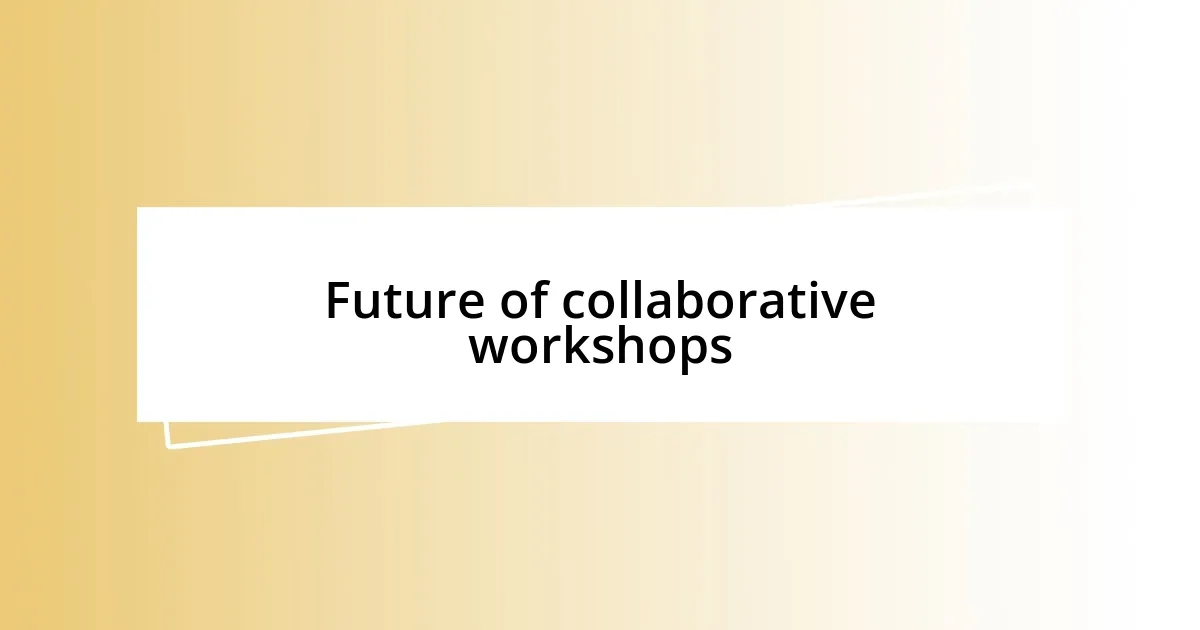
Future of collaborative workshops
The future of collaborative workshops is incredibly promising, especially as remote work continues to shape our interactions. I recently experienced a workshop where we employed virtual reality (VR) headsets, which transported us to an immersive creative space. Imagine walking through a virtual environment where ideas float around you—it was surreal! This kind of technology not only enhances engagement but also expands the creative possibilities. Have you ever thought about how VR could change the way we brainstorm?
Moreover, I see a growing trend toward inclusivity in these workshops. I participated in one where we ensured that diverse voices were heard by implementing a “silent brainstorming” session. Participants had the chance to write down their ideas anonymously before sharing them. It was transformative to witness how this method encouraged everyone’s input. How often do you think people’s ideas are left unheard in conventional formats?
Finally, as we move forward, I believe the integration of artificial intelligence (AI) will play a significant role in personalizing workshop experiences. In one recent workshop, we used AI tools to analyze participants’ preferences and tailor the agenda accordingly. The outcomes were astounding; people felt more invested because the content resonated with their interests. Isn’t it exciting to consider how technology can make collaborative experiences more tailored and meaningful for everyone involved?












